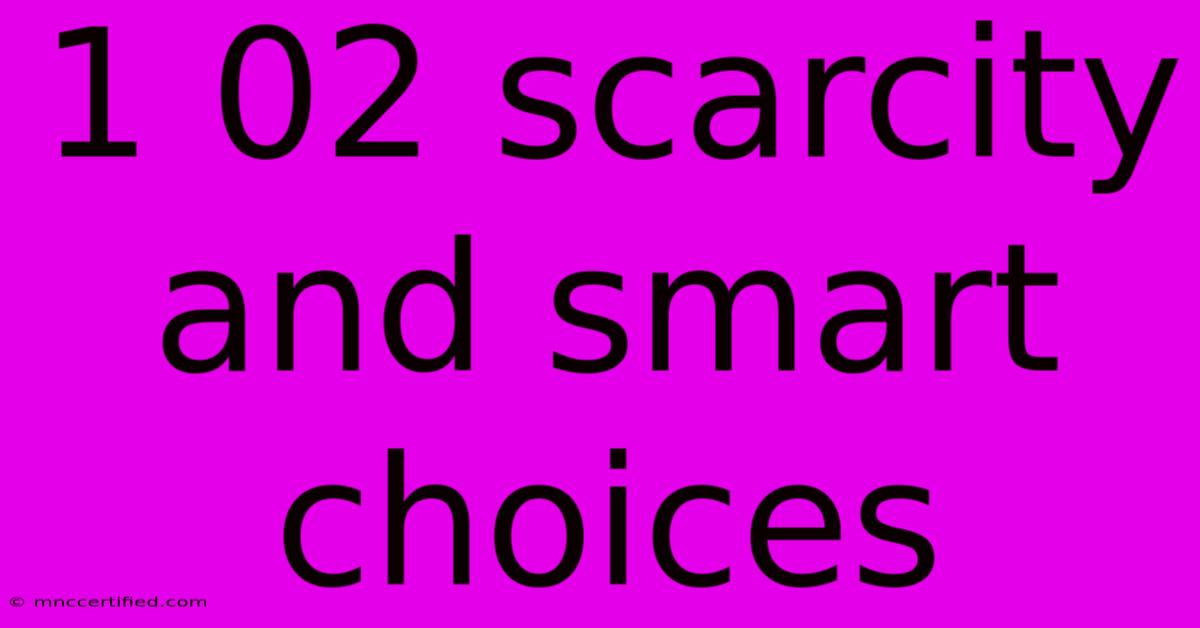1 02 Scarcity And Smart Choices

Table of Contents
102: Scarcity and Smart Choices: Mastering the Art of Limited Resources
We live in a world of abundance, yet scarcity remains a powerful force shaping our decisions. Understanding how scarcity influences our choices is crucial for making smart, informed decisions, both in our personal lives and in business. This article delves into the psychology of scarcity, its impact on our behavior, and strategies for navigating resource constraints effectively.
The Psychology of Scarcity: Why Less Feels Like More
The principle of scarcity, a cornerstone of economics and psychology, suggests that items and opportunities become more desirable when their perceived availability is limited. This isn't merely about physical limitations; it's about perceived scarcity, often fueled by marketing and social influences. Think of the "limited edition" tag or the "only a few left" message – these phrases tap into our innate desire for exclusivity and fear of missing out (FOMO).
The Power of FOMO (Fear of Missing Out)
FOMO is a potent driver of impulsive decisions. The fear of regretting a missed opportunity can override rational judgment, leading us to make purchases or choices we might otherwise avoid. Marketers expertly leverage FOMO, creating artificial scarcity to boost sales and engagement. Understanding this psychological mechanism is essential to resisting its influence.
Scarcity's Impact on Decision-Making
Scarcity distorts our perception of value. When something is scarce, we tend to:
- Overestimate its value: We place a higher worth on scarce items, even if their objective value remains unchanged.
- Focus on the potential loss: The pain of losing something outweighs the pleasure of gaining something comparable.
- Become more competitive: Scarcity triggers a sense of urgency and competition, pushing us to act quickly.
Smart Choices in a World of Scarcity
While scarcity can lead to poor decisions, it's also a powerful motivator for creativity and efficiency. Here's how to harness its positive aspects and mitigate its negative effects:
1. Prioritize and Plan: The Power of Budgeting
Effective resource management begins with planning. Whether you're managing your finances, time, or other limited resources, creating a budget is paramount. This involves:
- Identifying your needs and wants: Distinguishing between necessities and desires helps allocate resources strategically.
- Setting realistic goals: Defining clear, achievable goals provides focus and direction.
- Tracking your spending/usage: Regular monitoring helps identify areas for improvement and prevents overspending.
2. Embrace Resourcefulness and Creativity
Scarcity fosters innovation. When resources are limited, we're forced to find creative solutions and optimize existing resources. This can lead to breakthroughs in efficiency and productivity. Think outside the box; explore alternative options and utilize available tools effectively.
3. Resist Impulsive Decisions: The Importance of Patience
Don't let the pressure of scarcity drive impulsive purchases or choices. Take time to consider your options, weigh the pros and cons, and resist the urge to act solely based on fear or perceived urgency.
4. Seek Information and Compare Options: Informed Decisions
Before making any significant decision under scarcity, thoroughly research your options. Compare prices, features, and benefits to make an informed choice that aligns with your needs and budget. Avoid making rash decisions based on limited information.
Conclusion: Navigating Scarcity Strategically
Scarcity is an inherent part of life. By understanding its psychological impact and employing strategic planning, resourcefulness, and patience, we can navigate resource constraints effectively and make smart choices that align with our long-term goals. Mastering the art of managing limited resources empowers us to achieve more with less and thrive even in challenging circumstances. Remember, informed decisions, driven by careful consideration rather than fear, are the key to overcoming scarcity's challenges.

Thank you for visiting our website wich cover about 1 02 Scarcity And Smart Choices. We hope the information provided has been useful to you. Feel free to contact us if you have any questions or need further assistance. See you next time and dont miss to bookmark.
Featured Posts
-
Two Detained Suspect Package At Gatwick
Nov 23, 2024
-
Trump Expected To Tap Loeffler For Agriculture
Nov 23, 2024
-
Hilfigers Alba Hurup Joins F1 Academy 2025
Nov 23, 2024
-
Gatwick Airport Detainees Over Package
Nov 23, 2024
-
Lakers Win Streak Ends Wagners Key Role
Nov 23, 2024